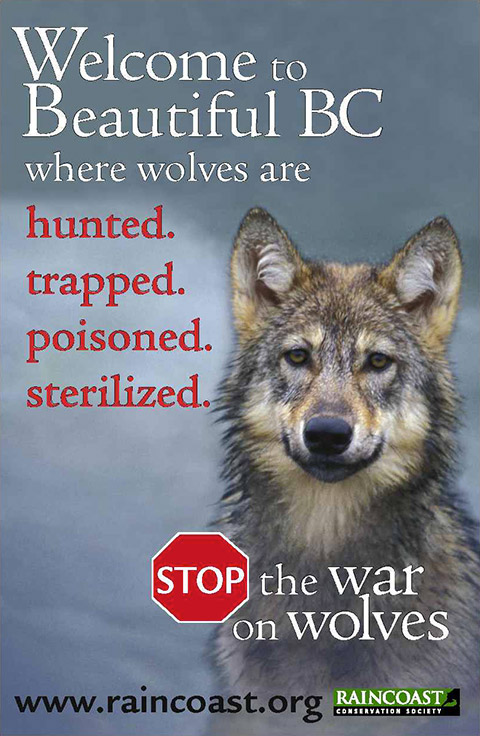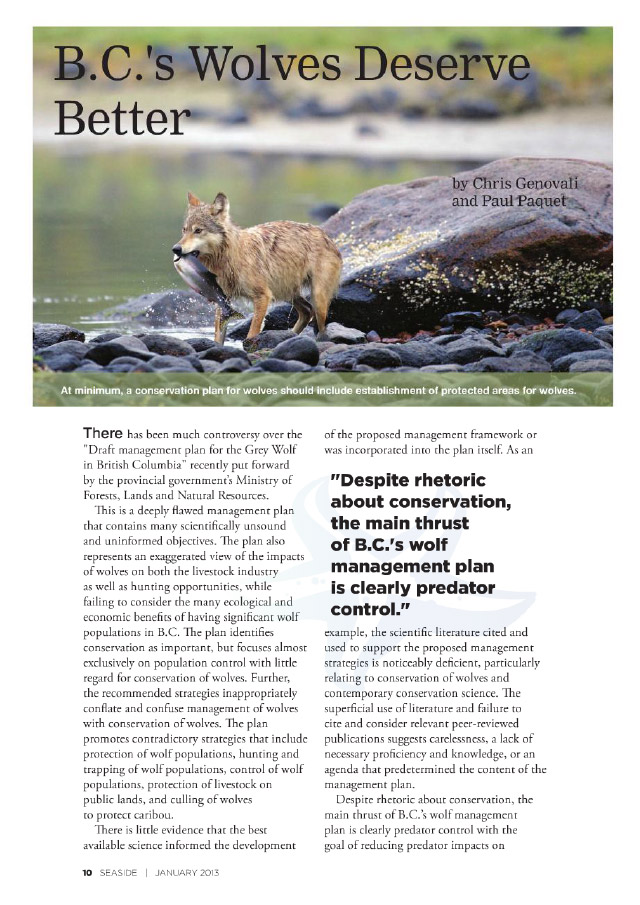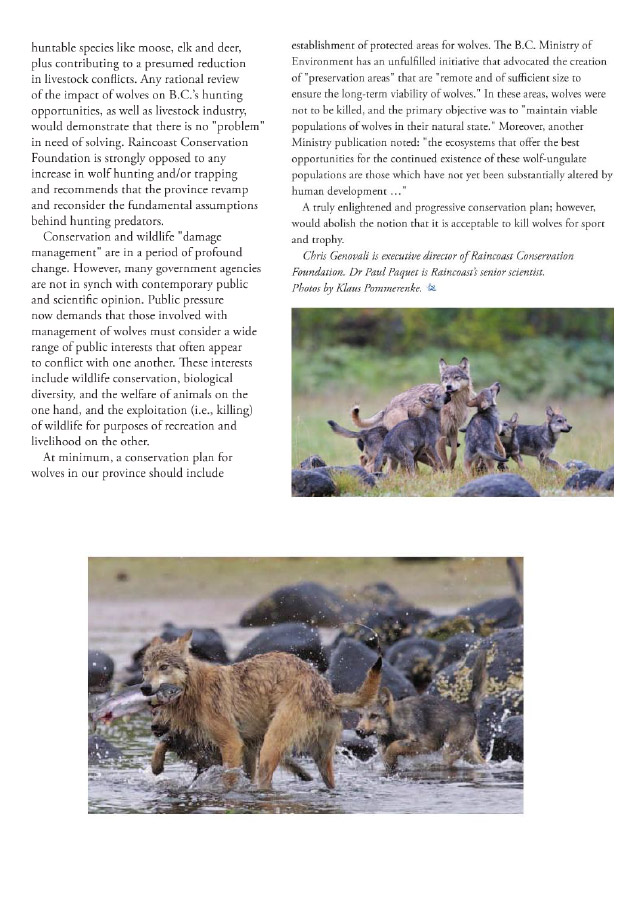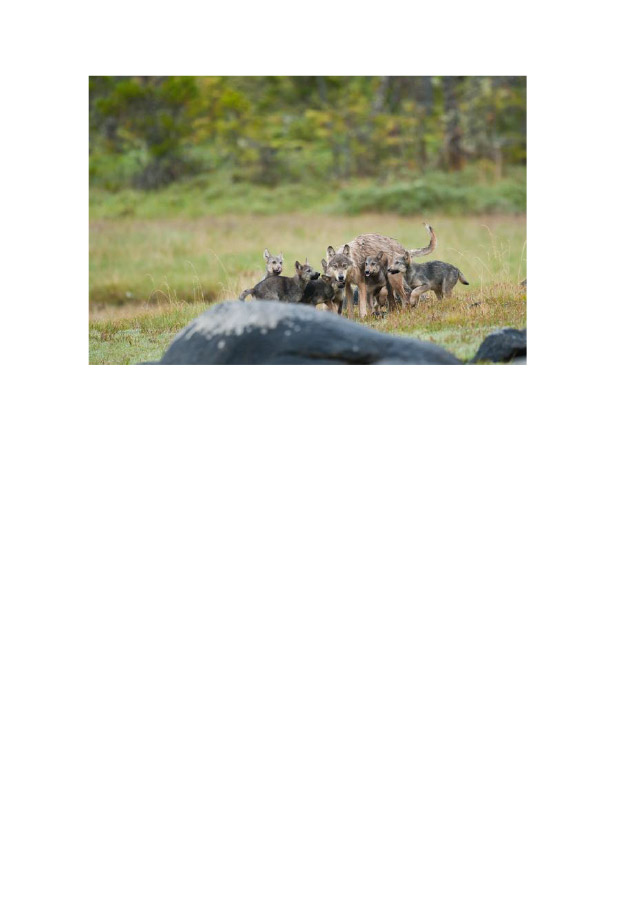|
| |
| 22. Januar 2013 |
Kritik am Entwurf des Wolf Management Plans
der Provinzregierung von BC reißt nicht ab |
| |
| Die Kritik an dem im November 2012 vorgelegten Entwurf für einen neuen Wolf Management Plan in BC reißt auch nach dem Ende der Frist zum Einreichen von Stellungnahmen hierzu nicht ab. Der vom Ministry of Forest, Lands and Natural Resource Operations vorgelegte Entwurf ist ein Freibrief für einen Vernichtungsfeldzug gegen Wölfe in BC (vgl. Meldung vom 29.11.2012 auf dieser Website). In ihrem Artikel „BC Wolf Management Plan Scapegoats Carnivores“ äußern sich Chris Genovali und Paul Paquet von der Raincoast Conservation Foundation zu diesem Plan (The Huffington Post, 10.01.2013): „This is a deeply flawed management plan that contains many scientifically unsound and uninformed objectives. The plan also represents an exaggerated view of the impacts of wolves on both the livestock industry as well as hunting opportunities, while failing to consider the many ecological and economic benefits of having significant wolf populations in B.C.“. Chris Genovali und Paul Paquet bemängeln darüber hinaus, dass der Plan nicht auf den Ergebnissen wissenschaftlicher Forschungen beruht, sondern sich von Lobbyinteressen leiten lässt: „The scientific literature cited and used to support the proposed management strategies is noticeably deficient, particularly relating to conservation of wolves and contemporary conservation science. The superficial use of literature and failure to cite and consider relevant peer reviewed publications suggests carelessness, a lack of necessary proficiency and knowledge, or an agenda that predetermined the content of the management plan. Despite rhetoric about conservation, the main thrust of B.C.’s wolf management plan is clearly killing predators with the goal of reducing predator impacts on huntable species like moose, elk and deer, plus contributing to a presumed reduction in livestock conflicts on public lands. Any rational review of the impact of wolves on B.C.’s hunting opportunities, as well as livestock industry, would demonstrate that there is no „problem“ in need of solving. Rationality, however, long ago ceased to be the currency of wildlife management policy in B.C. … The B.C. government claims to use the „best available science“ in wildlife management decisions. Nothing could be further from the truth. Clearly, relevant science is ignored because it refutes the legitimacy of many of the province’s management prescriptions. Implying that indiscriminate hunting and trapping will reduce human conflicts with wolves directly contradicts contemporary wildlife science, which shows that hunting and trapping of predators exacerbates, rather than reduces, human-wildlife conflicts. Why is the province failing to use science in their management decisions? One can only conclude that they have been successfully lobbied and manipulated to represent the narrow interests of trophy hunters, guide outfitters, and livestock industry.“ |
| |
 |
| © Raincoast Conservation Foundation, mit einem Bild von Ian McAllister |
| |
| Wolfsschutzgebiete sind zwar seit langem in BC in der Diskussion, aber auch im neuen Wolf Management Plan fehlt jeder Hinweis, dass solche Gebiete in absehbarer Zeit eingerichtet werden. Chris Genovali und Paul Paquet stellen fest: „At minimum, a conservation plan for wolves in B.C. should include establishment of protected areas for wolves. The B.C. Ministry of Environment has an unfulfilled initiative that advocated the creation of ‚preservation areas‘ that are ‚remote and of sufficient size to ensure the long-term viability of wolves‘. In these areas, wolves were not to be killed, and the primary objective was to ‚maintain viable populations of wolves in their natural state‘. Moreover, another ministry publication noted, the ecosystems that offer the best opportunities for the continued existence of these wolf-ungulate populations are those which have not yet been substantially altered by human development. The proposed wolf management plan is simply a continuation of the tired old school anti-predator approach in which scapegoating large carnivores is the default strategy. For instance, the province myopically chooses to focus on the proximate causes of caribou decline, while deliberately refusing to address the ultimate causes – namely human caused disturbance and degradation to caribou habitat. … With an emphasis on killing wolves as its primary management tool, the draft plan has created an atmosphere in which perverse enterprises such as wolf killing derbies are seen as a reasonable response in some quarters. That said, the proposed wolf-killing contest in northeast B.C. is not only unethical and immoral, this macabre activity scrapes the bottom of the barrel in terms of human behaviour and speaks ill of British Columbians’ relationship to wildlife.“ |
| |
| Nachfolgend abgedruckt finden Sie einen Artikel von Chris Genovali und Paul Paquet aus dem Seaside-Magazin vom Januar 2013 (Seaside – Your West Coast Culture). |
| |
 |
 |
 |
| |
 zurück zurück |
|
|

